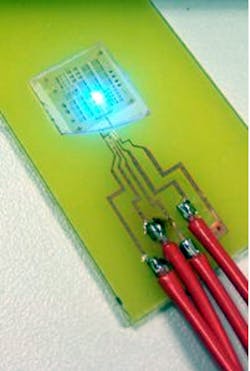LED design inspired by fireflies
The nighttime twinkling of fireflies has inspired scientists to modify a light-emitting diode (LED) so it is more than one and a half times as efficient as the original.
Researchers from Belgium, France, and Canada studied the internal structure of firefly lanterns, the organs on the bioluminescent insects' abdomens that flash to attract mates.
The scientists identified an unexpected pattern of jagged scales that enhanced the lanterns' glow, and applied that knowledge to LED design to create an LED overlayer that mimicked the natural structure.
The overlayer, which increased LED light extraction by up to 55 percent, could be easily tailored to existing diode designs.
The work was published in a pair of papers in the Optical Society’s (OSA) open-access journal Optics Express. More information can be found here.
Related articles on lighting from Vision Systems Design.
1. Machine-vision needs change with color imaging: Part I
Glenn Archer, principal at Quadrant Solutions, describes the different types of RGB color cameras that are available and how images captured by them are affected by lighting.
2. Practical guide to machine vision lighting goes on-line
Daryl Martin, the Midwest Sales and Support Manager of Advanced Illumination (Rochester, VT, USA) has written a 21-page guide to help those in the machine vision industry choose the most appropriate lighting for their system.
-- Dave Wilson, Senior Editor, Vision Systems Design
